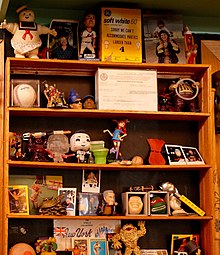Tchotchke
A tchotchke (/ˈtʃɒtʃkə/ CHOTCH-kə)[1][2][3][4][5] is a small bauble or miscellaneous item. The word has long been used by Jewish-Americans and in the regional speech of New York City and elsewhere. It is Slavic in origin. In Kurdish (an Indo-European language) Tchotchke (spelled Chochick or cheechick) means sparrow and toddlers are often called Tchotchke as a term of endearment.

The word may also refer to free promotional items dispensed at trade shows, conventions, and similar commercial events. They can also be sold as cheap souvenirs in tourist areas, which are sometimes called "tchotchke shops".
Spelling
A wide variety of spellings exist for the English usage of the term, e.g., tshotshke, tshatshke, tchachke, tchotchka, tchatchka, chachke, tsotchke, chotski, or chochke; the standard Yiddish transliteration is tsatske or tshatshke. In YIVO standard orthography, it is spelled טשאַטשקע. In Israeli Hebrew it is often spelled צאצקע, [ˈtsats.ke], with a tsade instead of teth-shin, as in Yiddish. A Hebrew variant is צ׳אצ׳קע,[6] using צ (tsade) with a single apostrophe (usually called a chupchik, or geresh in more formal parlance).
Alternative meanings and context
Depending on context, the term has a connotation of worthlessness or disposability as well as tackiness.[7][8]
A common confusion is between the terms tchotchke and tsatske or rather tsatskele, with the diminutive ending -le. Both terms have the same Slavic root, but the tch- version stems from Russian, while the ts- originates in Polish. Tchotchke usually references trinkets, while tsatskele is more likely to mean a young girl or woman who uses her charms in order to reach her goals. Being Yiddish, the meaning can change by the use of gestures and a change in tone, so that tsatskele can become the favorite child.
Leo Rosten, author of The Joys of Yiddish, combines the two main meanings and gives an alternative sense of tchotchke as meaning a desirable young girl, a "pretty young thing". Less flatteringly, the term could be construed as a more dismissive synonym for "bimbo", or "slut".[9]
Etymology
The word tchotchke derives from a Slavic word for "trinket" (Ukrainian: цяцька, romanized: tsjats'ka [ˈtsʲɑtsʲkɐ] (![]()
![]()
![]()
See also
References
- Oxford Dictionaries, Oxford University Press, tchotchke : /ˈtʃɒtʃkə/
- "Tchotchke - Definition and More from the Free Merriam-Webster Dictionary". merriam-webster.com.
- "tchotchke". TheFreeDictionary.com.
- "tchotchke: meaning and definitions". infoplease.com.
- "Tchotchke dictionary definition - tchotchke defined". yourdictionary.com.
- Kordova, Shoshana. "Word of the Day / Chupchik צ'וּפְּצִ'יק". Ha'aretz. Archived from the original on 10 June 2018. Retrieved 10 June 2018.CS1 maint: BOT: original-url status unknown (link)
- Wolochatiuk, Nick (March 26, 2009). "Tchotchke, chachka, tsatke ... whatever". Cornwall Seaway News.
- "Inside the Bernie Madoff Tchotchke Auction" Archived 2010-02-21 at the Wayback Machine, Gawker
- Rosten, Leo (2003). Bush, Lawrence (ed.). The New Joys of Yiddish. Crown Publishing Group. p. 403. ISBN 9780609806920. Illustrated, reprint edition.
- J. Kačala et al.: Short Dictionary of Slovak Language. Veda, 2003. (meaning: cheap decorative thing, trinket)
External links
| Look up tchotchke in Wiktionary, the free dictionary. |
- Tchotchke (n.) on Online Etymology Dictionary
- Tchotchke etymology on World Wide Words